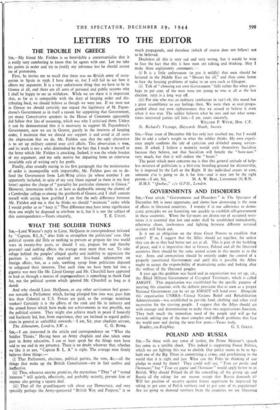LETTERS TO THE EDITOR
THE TROUBLE IN GREECE
Sta,—My friend Mr. Fielden is so formidable a controversialist that it is really very comforting to know that he agrees with one. Let me take his points in order and try to justify my inference lest he should accuse me of pretension.
First, he invites me to recall that there was no British army of occu- pation in Spain in 1936. I have done so, but I still fail to see how it affects my argument. It is a very unfortunate thing that we have to be in Greece at all, and there are all sorts of personal and public reasons why I shall be happy to see Us withdraw. While we are there it is important that, as far as is compatible with the duty of keeping order and dis- tributing focd, we should behave as though we were not. If we were not in Greece we should certainly not regard the legitimacy of M. Papan- dreou's Government as in itself a reason for supporting that Government, yet many Conservative speakers in the House of Commons apparently did follow that line of reasoning, which was why I criticised them. Unless it can be demonstrated that it is necessary to support M. Papandreou's Government, now we are in Greece, purely in the interests of keeping order, I maintain that we should not support it and avoid at all costs the impression that we do. Mr. Fielden says that the oply alternative is to set up military control over civil affairs. This observation is true, and its truth is not a whit diminished by the fact that I made it myself in the letter which Mr. Fielden is attacking. Indeed, it was the whole burden of my argument, and my only motive for departing from an otherwise invariable rule of writing on'y for profit.
Finally, after roundly stating in his first paragraph that the maintenance of order is incompatible with impartiality, Mr. Pielden goes on to de- fend the Government from Left-Wing critics (in whose number I am apparently included, in spite of my very blunt reproof to them in my first letter) against the charge of "partiality for particular elements in Greece." However, internecine strife is at least as deplorable among the alumni of a Cambridge college as among the goatherds of Greece, and I shall content myself with saying how gratified I am that the only difference between Mr. Fielden and me is that he thinks we should " maintain " order while I would prefer us to "keep it." That difference may have more significance than one might be disposed to attribute to it, but it is not the subject of this correspondence.—Yours sincerely, T. E. UTLEY.


























 Previous page
Previous page